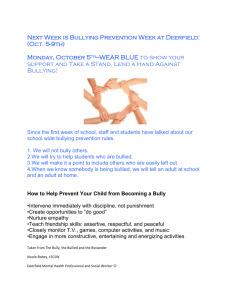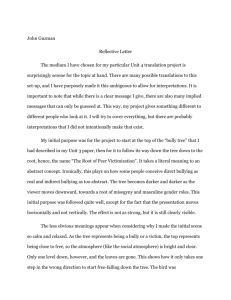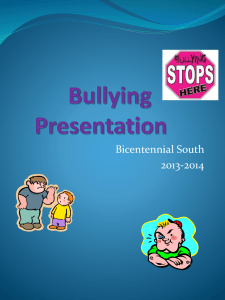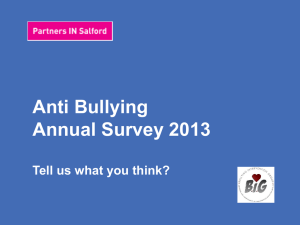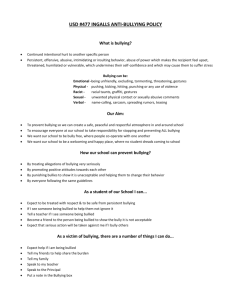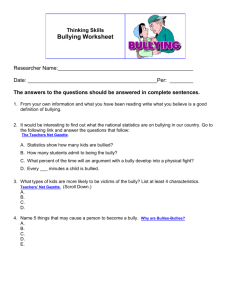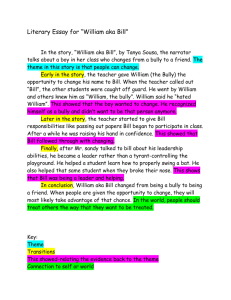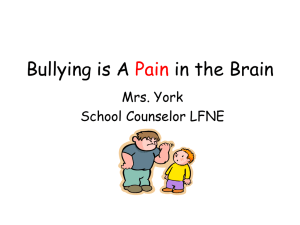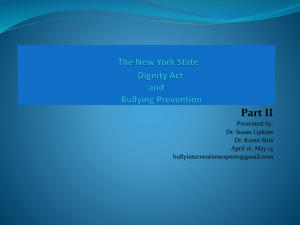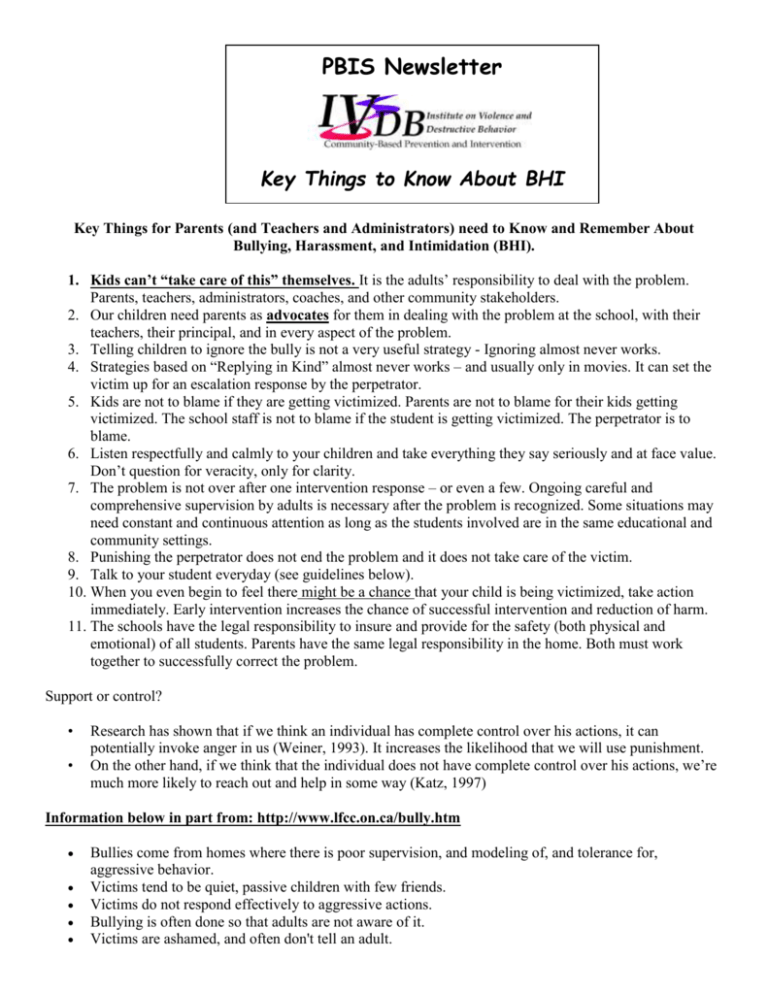
PBIS Newsletter
Key Things to Know About BHI
Key Things for Parents (and Teachers and Administrators) need to Know and Remember About
Bullying, Harassment, and Intimidation (BHI).
1. Kids can’t “take care of this” themselves. It is the adults’ responsibility to deal with the problem.
Parents, teachers, administrators, coaches, and other community stakeholders.
2. Our children need parents as advocates for them in dealing with the problem at the school, with their
teachers, their principal, and in every aspect of the problem.
3. Telling children to ignore the bully is not a very useful strategy - Ignoring almost never works.
4. Strategies based on “Replying in Kind” almost never works – and usually only in movies. It can set the
victim up for an escalation response by the perpetrator.
5. Kids are not to blame if they are getting victimized. Parents are not to blame for their kids getting
victimized. The school staff is not to blame if the student is getting victimized. The perpetrator is to
blame.
6. Listen respectfully and calmly to your children and take everything they say seriously and at face value.
Don’t question for veracity, only for clarity.
7. The problem is not over after one intervention response – or even a few. Ongoing careful and
comprehensive supervision by adults is necessary after the problem is recognized. Some situations may
need constant and continuous attention as long as the students involved are in the same educational and
community settings.
8. Punishing the perpetrator does not end the problem and it does not take care of the victim.
9. Talk to your student everyday (see guidelines below).
10. When you even begin to feel there might be a chance that your child is being victimized, take action
immediately. Early intervention increases the chance of successful intervention and reduction of harm.
11. The schools have the legal responsibility to insure and provide for the safety (both physical and
emotional) of all students. Parents have the same legal responsibility in the home. Both must work
together to successfully correct the problem.
Support or control?
•
•
Research has shown that if we think an individual has complete control over his actions, it can
potentially invoke anger in us (Weiner, 1993). It increases the likelihood that we will use punishment.
On the other hand, if we think that the individual does not have complete control over his actions, we’re
much more likely to reach out and help in some way (Katz, 1997)
Information below in part from: http://www.lfcc.on.ca/bully.htm
Bullies come from homes where there is poor supervision, and modeling of, and tolerance for,
aggressive behavior.
Victims tend to be quiet, passive children with few friends.
Victims do not respond effectively to aggressive actions.
Bullying is often done so that adults are not aware of it.
Victims are ashamed, and often don't tell an adult.
1. Ask the child directly. Often children do not wish to tell their parents due to shame and embarrassment, or
fear that bullies will retaliate if they tell. Look for signs such as: fear of going to school, lack of friends, missing
belongings and torn clothing, and increased fearfulness and anxiety.
2. Work with the school immediately to make sure your child is safe, that effective consequences are applied
toward the bully, and that monitoring at school is adequate. Advocate for involvement of the bully's parents. If
the bullying is happening on the way to and from school, arrange for the child to get to school with older,
supportive children, or take him or her until other interventions can take place.
3. If your child is timid, and lacks friends, try to arrange for your child participate in positive social groups
which meet his or her interests. Developing your child's special skills and confidence in the context of a positive
social group can be very helpful.
4. Suggest that the school implement a comprehensive anti-bullying program. A home-and school association
meeting to discuss and support such an initiative can be helpful.
For the Parents of a Child who is Suspected of, or identified as being, a bully:
Take the problem seriously. Children and youth who bully others often get into serious trouble in later life, and
may receive criminal convictions. They may have continuing trouble in their relationships with others. Here are
some things you can do to turn the situation around.
1. Talk to your child, talk to his or her teachers and administrators. Keep in mind that a bully will try to deny or
minimize his or her wrong-doing.
2. Make it clear to your child that you will not tolerate this kind of behavior, and discuss with your child the
negative impact bullying has on the victims. Do not accept explanations that "it was all in fun."
3. Arrange for an effective, non-violent consequence, which is in proportion with the severity of your child's
actions, and his or her age and stage of development. Corporal punishment carries the message that "might is
right."
4. Increase your supervision of your child's activities and whereabouts, and who they are associating with.
Spend time with your child, and set reasonable rules for their activities and curfews.
5. Co-operate with the school in modifying your child's aggressive behavior. Frequent communication with
teachers and/or administrators is important to find out how your child is doing in changing his or her behavior.
6. Praise the efforts your child makes toward non-violent and responsible behavior, as well as for following
home and school rules. Keep praising any efforts the child makes.
7. If your child is viewing violent television shows, including cartoons, and is playing violent video games, this
will increase violent and aggressive behavior. Change family and child's viewing and play patterns to nonviolent ones.
8. Make sure that your child is not seeing violence between members of his or her family. Modeling of
aggressive behavior at home can lead to violence by the child against others at school and in later life.
9. Seek help from a school psychologist, social worker, or children's mental health centre in the community if
you would like support in working with your child.
Below from:
http://www.bullying.co.uk/parents/parentsl_advice.htm
Copyright Liz Carnell and Bullying Online 1999 – 2006. All rights reserved
ADVICE TO PARENTS
Finding out that your child is being bullied is a stressful and distressing experience. It’s natural for a
parent to feel anger, confusion and guilt.
Some children are good at hiding their feelings and the first you may know of the problem is when your
child suddenly doesn’t want to go to school, or says they are ill when PE lessons are on the agenda.
Other pointers can be:
Coming home with cuts and bruises
Torn clothes
Asking for stolen possessions to be replaced
‘Losing’ lunch money
Falling out with previously good friends
Being moody and bad tempered
Being quiet and withdrawn
Wanting to avoid leaving the house
Aggression with brothers and sisters
Doing less well at schoolwork
Insomnia
Anxiety
The worst thing to do is to over-react and storm into school demanding action. Bullying Online
is regularly contacted by parents who have lost their temper and ended up banned from the
premises or in trouble with the police.
Don’t forget that if you didn’t know your child was being bullied then the school may not have realized it
either. The class teacher/head of year isn’t your child’s constant companion and isn’t a mind reader.
If you
think your young child is being bullied, but you’re not sure, then ask a few simple questions:
What did they do at school today?
Did they do anything they liked?
Did they do anything they didn’t like?
Who did they play with?
What sort of games did they play?
Did they enjoy them?
Would they have liked to play different games with someone else?
Are they looking forward to going to school tomorrow?
For an
older child you can ask:
What did they do at lunchtime today?
Is there anyone they’d like to invite home?
Is there any lesson at school they don’t like?
Is there anyone at school they don’t like and why?
Are they looking forward to going to school tomorrow?
Keep a diary of what your child says is happening
Or get your child to keep his/her own diary
Write a note to the class teacher or head of year, explaining that the problem is still unresolved
Ask for your letter to be put onto your child’s school file, together with a note of action taken
Suggest that contact between the bully and your child is monitored and limited, perhaps by the
bully moving to another table or set


